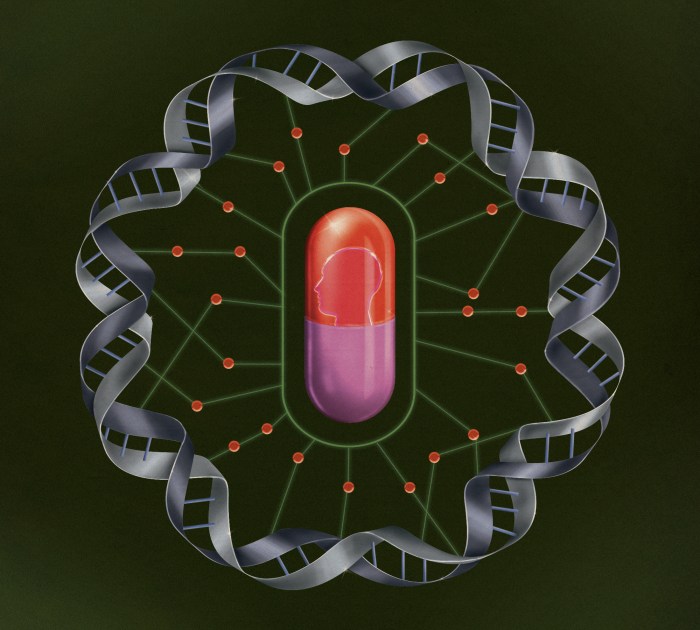
Exploring the realm of innovative treatments tailored by health specialists, this introduction sets the stage for a captivating journey through the transformative landscape of personalized healthcare. From cutting-edge advancements to individualized care plans, this topic sheds light on the evolving intersection of technology and medical expertise.
As we delve deeper into the nuances of personalized treatment plans and the role of health specialists in shaping the future of healthcare, a world of possibilities unfolds before us.
Innovative treatments tailored by health specialists
Personalized treatment plans in healthcare are crucial as they take into account an individual’s unique characteristics, such as genetics, lifestyle, and medical history. This approach allows health specialists to create tailored treatments that are more effective and have fewer side effects compared to one-size-fits-all approaches.
Examples of personalized treatments
- Immunotherapy for cancer: By analyzing a patient’s immune system, specialists can develop customized immunotherapy treatments that target specific cancer cells, leading to improved outcomes.
- Precision medicine for genetic disorders: Through genetic testing, health specialists can identify genetic mutations that contribute to certain disorders and develop treatments that target these specific genetic abnormalities.
Role of technology in personalized treatments
Technology plays a crucial role in enabling health specialists to tailor treatments effectively. Advanced tools such as artificial intelligence, genetic sequencing, and wearable devices provide valuable insights into an individual’s health status, allowing specialists to create personalized treatment plans based on data-driven decisions.
Healthcare services

Healthcare services encompass a wide range of medical and non-medical services designed to promote health, prevent illness, and treat medical conditions. These services are crucial in ensuring the well-being of individuals and communities.
Types of healthcare services
- Hospital services: These include inpatient and outpatient care, emergency services, surgical procedures, and diagnostic testing.
- Primary care: Provided by healthcare professionals such as general practitioners, family physicians, and nurse practitioners, primary care focuses on preventive care, health maintenance, and treatment of common illnesses.
- Specialty care: Specialty care services are provided by healthcare professionals with specialized training in specific areas such as cardiology, oncology, and neurology.
- Mental health services: These services address mental health conditions through counseling, therapy, medication management, and support programs.
- Home healthcare: Home healthcare services are delivered in the patient’s home and include nursing care, physical therapy, and assistance with activities of daily living.
Evolution of healthcare services
Over the years, healthcare services have evolved significantly to meet the changing needs of patients and advancements in medical technology. The shift towards patient-centered care, emphasis on preventive medicine, and integration of digital health solutions are some of the key trends shaping the evolution of healthcare services.
Comparison of traditional vs. modern healthcare services
- Effectiveness:Traditional healthcare services often focus on treating acute illnesses and symptoms, while modern approaches emphasize preventive care and holistic treatment of the individual.
- Accessibility:Modern healthcare services leverage technology to improve access to care through telemedicine, mobile health apps, and remote monitoring, making healthcare more convenient and efficient for patients.
Medical care
Medical care plays a crucial role in promoting overall health and well-being by providing individuals with the necessary treatments and interventions to manage their health conditions effectively. It encompasses a wide range of services, including preventive care, diagnosis, treatment, and ongoing management of health issues.
Preventive care
Preventive care is essential in reducing the burden on healthcare systems by focusing on early detection and intervention to prevent the progression of diseases. Regular health screenings, vaccinations, healthy lifestyle choices, and education on risk factors are key components of preventive care that help individuals maintain good health and well-being.
- Regular health check-ups can help detect potential health issues early on, allowing for timely intervention and treatment.
- Vaccinations are crucial in preventing infectious diseases and protecting individuals from serious health complications.
- Adopting a healthy lifestyle, including a balanced diet, regular exercise, and stress management, can significantly reduce the risk of developing chronic conditions.
- Educating individuals on risk factors such as smoking, alcohol consumption, and poor diet can empower them to make informed decisions about their health.
Managing medical care
Individuals can actively engage in managing their medical care by taking proactive steps to prioritize their health and well-being. This includes seeking regular medical advice, following treatment plans prescribed by healthcare providers, and staying informed about their health conditions and available treatment options.
- Communicate openly with healthcare providers about any concerns, symptoms, or changes in health status to receive personalized care.
- Adhere to prescribed treatment plans, including medications, therapies, and lifestyle modifications, to effectively manage health conditions.
- Stay informed about health conditions by researching reliable sources, attending educational workshops, and asking questions during medical appointments.
- Maintain a health journal to track symptoms, treatments, and progress, enabling better communication with healthcare providers and informed decision-making.
Health insurance
Health insurance plays a crucial role in ensuring individuals have affordable access to necessary healthcare services. It provides financial protection against high medical costs and helps in managing health-related expenses effectively.
Types of Health Insurance Plans
- Health Maintenance Organization (HMO): These plans require individuals to choose a primary care physician and get referrals for specialists. They tend to have lower out-of-pocket costs but offer less flexibility in choosing healthcare providers.
- Preferred Provider Organization (PPO): PPO plans allow individuals to visit any healthcare provider without a referral, although staying within the network reduces costs. They offer more flexibility but may have higher premiums.
- Exclusive Provider Organization (EPO): EPO plans offer coverage only for services provided by healthcare professionals within the network, except in emergencies. They typically have lower premiums but limited provider options.
- Point of Service (POS): POS plans combine features of HMO and PPO plans. Individuals can choose a primary care physician and need referrals for specialists but can also seek care outside the network at a higher cost.
Challenges and Solutions
- High Premiums: Some individuals may find health insurance premiums unaffordable, leading to coverage gaps. Solutions could involve subsidies for low-income households or employer-sponsored plans with cost-sharing.
- Limited Coverage: Certain health insurance plans may not cover specific treatments or services, leaving individuals vulnerable to high out-of-pocket expenses. Enhancing coverage mandates or offering supplemental insurance options can address this issue.
- Complexity of Plans: Understanding the terms, conditions, and coverage details of health insurance plans can be challenging for many individuals. Improving transparency, providing clear information, and offering consumer-friendly tools can help in navigating through the complexities.
Medical research

Medical research plays a crucial role in the development of innovative treatments that have the potential to revolutionize healthcare. Through continuous research and experimentation, medical professionals can discover new ways to treat diseases, improve patient outcomes, and enhance overall quality of life.
Impact of medical research on innovative treatments
Medical research has significantly impacted the development of innovative treatments by providing insights into the underlying mechanisms of diseases and identifying potential targets for intervention. By studying the efficacy and safety of different treatment approaches, researchers can refine existing therapies or develop novel treatments that are more effective and tailored to individual patient needs.
- Recent breakthroughs in medical research
- Collaboration between researchers, health specialists, and patients
Recent breakthroughs in medical research
In recent years, medical research has led to groundbreaking discoveries that have transformed the landscape of healthcare. From the development of new drugs and therapies to the implementation of advanced technologies, these breakthroughs have paved the way for more personalized and effective treatments for a wide range of conditions.
Collaboration between researchers, health specialists, and patients
Effective collaboration between researchers, health specialists, and patients is essential for advancing medical knowledge and translating research findings into clinical practice. By working together, these stakeholders can ensure that innovative treatments are not only scientifically sound but also meet the needs and preferences of patients, ultimately improving health outcomes and quality of care.
Health facilities
Modern health facilities play a crucial role in providing quality patient care by offering state-of-the-art equipment, skilled healthcare professionals, and a comfortable environment for patients.
Types of Health Facilities
Health facilities come in various types, each serving different purposes in the healthcare system. Here are the key differences between hospitals, clinics, and urgent care centers:
- Hospitals:Hospitals are large healthcare institutions equipped to handle a wide range of medical conditions, from emergencies to specialized treatments. They have advanced medical equipment, specialists in various fields, and inpatient facilities for patients requiring overnight stays.
- Clinics:Clinics are smaller healthcare facilities that focus on specific medical services or specialties. They are often more accessible and offer outpatient care for routine check-ups, vaccinations, and minor treatments. Clinics may be privately owned or part of a larger healthcare network.
- Urgent Care Centers:Urgent care centers provide immediate medical attention for non-life-threatening conditions that require prompt care but do not warrant a visit to the emergency room. They offer extended hours, walk-in appointments, and basic medical services such as X-rays, lab tests, and minor procedures.
Significance of Well-Equipped Health Facilities
Well-equipped health facilities are essential for delivering effective healthcare services due to the following reasons:
- Timely Diagnosis and Treatment: Modern equipment and facilities enable healthcare providers to diagnose medical conditions accurately and promptly, leading to timely treatment and improved patient outcomes.
- Enhanced Patient Comfort: Well-equipped facilities provide a comfortable and safe environment for patients, contributing to their overall well-being and recovery.
- Efficient Operations: Advanced technology and tools streamline healthcare processes, reduce waiting times, and enhance the overall efficiency of healthcare delivery.
- Improved Outcomes: Access to cutting-edge medical technologies and facilities allows healthcare providers to offer the latest treatments and interventions, ultimately improving patient outcomes and satisfaction.
Health clinic

Health clinics play a crucial role in providing primary healthcare services to communities, serving as the first point of contact for individuals seeking medical care.
Specialized services offered
- Chronic disease management: Health clinics often offer specialized services for managing chronic conditions such as diabetes, hypertension, and asthma.
- Maternal and child health services: Many health clinics provide prenatal care, postnatal care, and pediatric services to support the health of mothers and children.
- Mental health services: Some health clinics offer counseling, therapy, and psychiatric services to address mental health concerns.
- Preventive care: Health clinics focus on preventive care measures such as vaccinations, screenings, and health education to promote overall wellness.
Benefits of seeking care at a health clinic
- Accessibility: Health clinics are often conveniently located in communities, making it easier for individuals to access healthcare services.
- Cost-effective: Health clinics typically offer affordable services and may accept health insurance, reducing out-of-pocket expenses for patients.
- Continuity of care: By establishing a relationship with healthcare providers at a health clinic, patients can receive consistent and coordinated care for their medical needs.
- Focus on prevention: Health clinics emphasize preventive care to help individuals maintain good health and detect potential issues early on.
Healthcare tips
Maintaining good health is crucial for a quality life. Here are some practical tips to help you stay healthy and prevent illnesses.
Regular Health Check-ups
Regular health check-ups are essential for early detection of health issues. Make sure to schedule annual check-ups with your healthcare provider to monitor your overall health status.
Healthy Eating Habits
A balanced diet rich in fruits, vegetables, whole grains, and lean proteins is key to maintaining good health. Avoid processed foods and excessive sugar intake to keep your body in top shape.
Physical Activity
Regular exercise is important for overall health and well-being. Aim for at least 30 minutes of moderate exercise most days of the week to keep your body strong and fit.
Stress Management
Chronic stress can have a negative impact on your health. Practice stress-reducing activities such as meditation, yoga, or deep breathing exercises to keep your mind and body in balance.
Stay Hydrated
Drinking an adequate amount of water is essential for good health. Aim to drink at least 8-10 glasses of water per day to stay hydrated and help your body function properly.
Get Enough Sleep
Quality sleep is crucial for overall health and well-being. Aim for 7-9 hours of sleep per night to allow your body to rest and recharge.
Health systems
The structure and effectiveness of healthcare systems vary across different countries, impacting the accessibility and quality of care provided to individuals. Public healthcare systems, funded and managed by the government, often aim to provide universal access to healthcare services, while private healthcare systems rely on private funding and cater to those who can afford it.
Each system has its strengths and challenges that influence the overall healthcare landscape globally.
Structure of Healthcare Systems
In different countries, healthcare systems can be structured in various ways, such as single-payer systems, multi-payer systems, or a combination of both. For example, countries like the United Kingdom have a single-payer system through the National Health Service (NHS), while the United States operates under a multi-payer system with a mix of public and private insurance providers.
Effectiveness of Healthcare Systems
The effectiveness of healthcare systems is often measured by indicators such as access to care, quality of care, patient outcomes, and overall population health. Countries with strong primary care systems tend to have better health outcomes and lower healthcare costs.
However, disparities in access to care and quality of services can still exist within different healthcare systems.
Challenges and Strategies for Improvement
Global health systems face several challenges, including rising healthcare costs, an aging population, increasing prevalence of chronic diseases, and unequal distribution of healthcare resources. To address these challenges, strategies such as investing in preventive care, promoting digital health technologies, enhancing healthcare workforce training, and improving healthcare infrastructure can help improve the overall effectiveness and efficiency of health systems worldwide.
Final Thoughts
In conclusion, the landscape of healthcare is undergoing a profound shift towards personalized and innovative treatments, guided by the expertise of health specialists. As technology continues to revolutionize the way we approach healthcare, the future holds endless possibilities for improving patient outcomes and enhancing overall well-being.
Questions Often Asked
What is the significance of personalized treatment plans in healthcare?
Personalized treatment plans cater to the specific needs of individual patients, ensuring targeted and effective care that leads to better outcomes.
How is technology enabling health specialists to tailor treatments more effectively?
Technology provides tools for precise diagnostics, personalized treatment algorithms, and remote monitoring, allowing health specialists to deliver tailored treatments with enhanced precision and efficiency.
What are some examples of innovative treatments customized for individual patients?
Examples include gene therapy, immunotherapy, and precision medicine, all of which highlight the shift towards personalized and targeted treatment approaches in healthcare.




